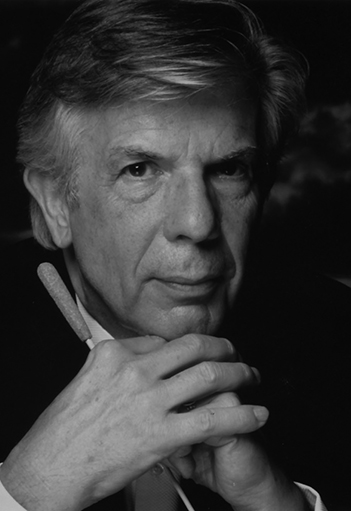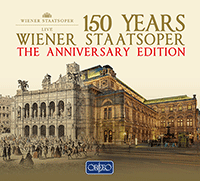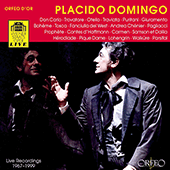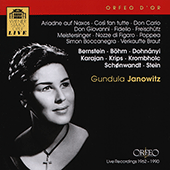Christoph von Dohnányi
Christoph von Dohnányi’s father, Hans, was the son of the great Hungarian musician Ernő von Dohnányi. Hans was one of the most brilliant legal minds of the inter-war years in Germany, and later became one of leading conspirators against Adolf Hitler, creating the Zossen files, a ‘chronicle of shame’ that documented German atrocities as justification for the actions that the conspirators would have to take against the German regime. He was executed at the Sachsenhausen concentration camp in 1945, following his arrest in 1943 with his brother-in-law, the distinguished theologian Dietrich Bonhoeffer, whose sister Christine was Christoph von Dohnányi’s mother. Prior to World War II Christoph studied the piano, but after it he studied law in Munich for two years, before entering the Munich Academy of Music to study composition, piano and conducting. On graduating in 1951 he was awarded the Richard Strauss Conducting Prize and continued his studies with his grandfather Ernő, who then was professor of piano at Florida State University. Ernő had known many of the leading figures in the international world of music, and during his time in Florida he would entertain the young Dohnányi with anecdotes and insights drawn from his extraordinary career. At the same time Christoph studied with Leonard Bernstein at the Berkshire Music Center at Tanglewood.
Dohnányi’s first professional appointment was at the Frankfurt Opera under its general music director Georg Solti, who engaged him as chorusmaster and conductor in 1953. Four years later he became Germany’s then-youngest general music director when he was made chief conductor at the Lübeck Opera, remaining there until 1963, before continuing on the classic German musical career path, holding successively the appointments of chief conductor at Kassel (1963–1966), Frankfurt (1968–1977) and Hamburg (1977–1984). In addition he was chief conductor of the West German Radio Symphony Orchestra at Cologne between 1964 and 1969. A notable success at this time was his conducting of the first performance in Berlin of Hans Werner Henze’s comic opera Der junge Lord. While at Frankfurt and Hamburg, Dohnányi successfully articulated an artistic policy that balanced traditional and innovative styles of opera production. Many distinguished singers launched their international careers at Frankfurt, while Dohnányi himself was the stage director there for new productions of Le nozze di Figaro and Fidelio.
A rare (for its time) performance of Mahler’s Symphony No. 5 at the Royal Festival Hall marked the occasion of Dohnányi’s British debut in 1965 with the London Philharmonic Orchestra. He first appeared at the Metropolitan Opera in New York in 1972, conducting Verdi’s Falstaff; and at the Royal Opera House, Covent Garden in 1974, replacing Josef Krips, with a powerful interpretation of Richard Strauss’s Salome. During this period he was a frequent guest conductor at the Vienna State Opera, and at the Salzburg Festival where he conducted the premières of Hans Werner Henze’s The Bassarids and Friedrich Cerha’s Baal, as well as Der Rosenkavalier. In December 1981 Christoph von Dohnányi first conducted the Cleveland Orchestra and was appointed music director designate the following year. He served as music director between September 1984 and August 2002, becoming music director laureate in September 2002. In addition to subscription concerts in Cleveland, Dohnányi and the orchestra appeared throughout the USA, Asia and Europe, including visits to the Salzburg Festival, the London Promenade Concerts and the Edinburgh Festival, and held several residencies at New York’s Carnegie Hall. In May 1998, for the first time in the orchestra’s history, they performed in China. During Dohnányi’s tenure, the orchestra’s musical home, Severance Hall, was renovated and expanded.
During the 1990s Dohnányi’s career continued to develop with appearances as guest conductor with the Berlin Philharmonic, Vienna Philharmonic, Israel Philharmonic, Royal Concertgebouw Amsterdam, New York Philharmonic, Chicago Symphony and Boston Symphony Orchestras. In the field of opera he returned often to the Royal Opera House, Covent Garden, conducting impressive readings of Beethoven’s Fidelio, Wagner’s Die Meistersinger von Nürnberg, Richard Strauss’s Die Frau ohne Schatten, and Berg’s Wozzeck; and was a welcome guest at La Scala, Milan, the Metropolitan Opera New York, the Lyric Opera of Chicago, the Zürich Opera and the Vienna State Opera where he conducted a new production of Der Ring des Nibelungen by Richard Wagner in 1992–1993. In 1997 Christoph von Dohnányi became chief conductor of the Philharmonia Orchestra, having been its principal guest conductor since 1994. The appearances of orchestra and conductor in opera at the Châtelet Theatre in Paris were especially notable, with stylish readings of, amongst many operas, Schoenberg’s Moses und Aron, Stravinsky’s Oedipus Rex, Humperdinck’s Hänsel und Gretel and Strauss’s Die schweigsame Frau and Arabella. Dohnányi’s most recent position is that of chief conductor of the North German Radio Symphony Orchestra in Hamburg, with effect from the 2004–2005 season. Here he continues a long line of outstanding chief conductors, including Hans Schmidt-Isserstedt, Klaus Tennstedt, Günter Wand and Christoph Eschenbach.
As a major international conductor in the classic mould, Christoph von Dohnányi’s discography is extensive. With the Cleveland Orchestra he recorded the complete symphonies of Beethoven, Brahms and Schumann; selected symphonies by Bruckner, Dvořák, Mahler, Mozart, Schubert and Tchaikovsky; works by Adams, Bartók, Berlioz, Birtwistle, Busoni, Ives, Ravel, Richard Strauss, Varèse and Webern; and Wagner’s Die Walküre and Das Rheingold. With the Vienna Philharmonic Orchestra his recordings have included Fidelio, Wozzeck and Lulu, Schoenberg’s Erwartung, Richard Strauss’s Salome, Wagner’s Der fliegende Holländer and orchestral works by Mendelssohn, Tchaikovsky and Stravinsky. He has also recorded the Violin Concerto of Philip Glass and Alfred Schnittke’s Concerto Grosso No. 5 with Gidon Kremer, and transcriptions for orchestra of chamber music: Beethoven’s String Quartet Op. 95 by Mahler and Brahms’s Piano Quartet in G minor by Schoenberg. Dohnányi is a straightforward, ‘no nonsense’ conductor, with a deep musical understanding that does not draw attention to itself. He consistently delivers performances in the concert hall, opera house, and recording studio of the highest calibre. In fact, so good is his conducting that there is a danger that his actually rare skills and insights are taken for granted.
As befits a musician of his pedigree, Dohnányi is aware of the importance of tradition. Commenting in the context of recruiting orchestral players, he has said, ‘The main thing is to find a certain style and to continue it, like they do in Vienna. It’s not necessarily a bad thing to have a tradition.’ He is also, unusually for a veteran maestro, open to new music and new experiences. He recalls evidence of this during his early years at Cleveland: ‘Coming from Europe, I didn’t know the music of Ruggles, and I find his Sun Treader a genius piece. Ives’s scores are evidence of his genius, not sloppy, but showing he was not satisfied with what he wrote, and how he tried to rewrite it. You can find this in Beethoven and Berlioz’s scores as well…The real genius composers are never ‘victorious’, just as in art you can never be victorious. You can only try harder and harder.’
© Naxos Rights International Ltd. — David Patmore (A–Z of Conductors, Naxos 8.558087–90).



















